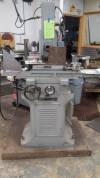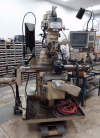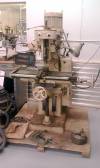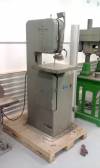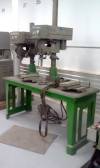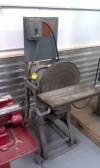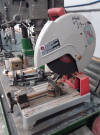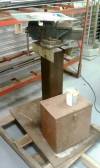Table of Contents
Machine Shop
Join the Makerspace Discord and check out the machining channel here: https://discord.gg/6ZyNFVbBuk
Last update: ES 11/11/23
- Updated trained member list
- Updated training section
Trainers
- Bill Williams
- James Tiedemann
- Eric Sanford
- Jordan Missiaen
Classes
- Basic Machine Shop: Manual mill/lathe, general shop tools (band saws, drill presses, tapping arm, bench grinders)
- CAM Programming: Tool path programming used to run Tormach machining centers (coming in September)
- If you already have Fusion 360 CAD experience, these two videos are a good place to start for CAM:
- Machining Center Operation: Tormach CNC machining centers at the Lenox location (coming in September)
Training
Machine shop basics training is currently being done monthly upon request. If you'd like to schedule training contact Eric Sanford at ericdsanford@gmail.com with subject line “Machine Shop Training Request - <your name>”.
Keep in mind that basics training is the bare minimum to allow you to operate shop equipment without hurting yourself or damaging the machinery. While you will have access to everything you need to make many awesome things, due to time restrictions this training will not show you exactly how to make said awesome things.
It will be on you to dig deeper and find the information you need to move forward. There is a huge amount of training material out there, particularly on YouTube. Another great way to learn is to do a simple project with someone. Even if you're at the same skill level having someone there to discuss things with is usually very helpful. If you get stuck, please post questions on the machining Discord or member forum and talk to a trainer or more experienced member. Remember to always prioritize safety.
Trained Members
This only lists members trained on or after 7/28/23. If you were trained previously it still applies and no retraining is required.
Basic Machine Shop:
- Adam Pirkey (ES 7/28/23)
- Sara C (ES 7/29/23)
- Ryan McDermott (ES 7/29/23)
- Paco (ES 7/30/23)
- Jon Drayna (ES 7/30/23)
- Raymond Cashaw (ES 8/4/23)
- Chris Aunderseng (ES 8/5/23)
- Stuckey (ES 8/6/23)
- Bart (ES 8/6/23)
- Preston Edmonds (ES 8/13/23)
- Jim Cielinski (ES 8/13/23)
- Tony C (ES 8/18/23)
- Lexi Morrison (ES 8/18/23)
- Cherie N (ES 8/18/23)
- Theo Coyer (ES 8/20/23)
- Kelly Coyer (ES 8/20/23)
- Juliet Jaeger (ES 8/22/23)
- Devin (ES 9/3/23)
- Ben Vosters (ES 9/3/23)
- Stefan (ES 9/3/23)
- Keenan L (ES 9/3/23)
- Christopher Otto (ES 9/16/23)
- John Wright (ES 9/16/23)
- Thomas Raymond (ES 9/16/23)
- Harrison Strupp (ES 10/6/23)
- Spencer Strupp (ES 10/6/23)
- Don Marwin (11/10/23)
- Paul Nurczyk (11/10/23)
Basic Shop Safety Notes
This isn't an exhaustive list. If something feels unsafe it most likely is. Please stop and rethink your strategy and/or ask for help.
- ALWAYS wear safety glasses and close toed footwear in the shop
- ALWAYS tie long hair back and ensure it stays back, it can get caught in the equipment
- NEVER wear gloves, jewelry, or (unrolled) long sleeves, they can get caught in the equipment and take you in with them
- If you are doing something that you think you need gloves for, consider holding the item with vice-grips or pliers instead
- NEVER leave chuck keys in the lathe chucks or wrenches on the mill draw bars and ALWAYS double check that they are removed before turning any spindle on
- Suggest wearing long pants that cover the top of your footwear to avoid hot chips falling into your shoes
- If a member is actively working on a machine try to avoid approaching in a way that could startle them
Reference Material
Makerspace Machine Specific Videos:
- Work in progress - we will be creating instructional videos for each machine
- These will NOT take the place of general shop training
- If you receive basic shop training on any knee mill/lathe, general shop tool etc., you may watch the video on any equivalent machine at either location and be free to use it
- Once the videos are up these groupings will be laid out
Bridgeport Mill Basics:
Edge Finding for Milling Machines:
Cutting Speeds and RPM for Milling: (see additional info below in resources section)
Climb vs Conventional Milling:
Tramming a Vise on a Milling Machine:
Blondihacks Lathe & Mill Skills Series:
Squaring Stock:
South Bend “How to Run a Lathe”:
South Bend Lathe Walk Through (different model than the one at Lenox but functionally almost identical):
Machining related YouTube channels we enjoy:
Basic Items To Consider Purchasing
You can certainly get things done in the shop without owning these, but you might often find yourself searching for them or finding work-arounds when they can't be located. There are far more choices than those listed below, but these are good some low cost options.
The number in brackets after each item indicates the priority for each item:
[1]: These are the most “bang for your buck”. They are cheap, used all the time, and most are useful outside of machining.
[2]: These are either available and relatively easy to find in the Makerspace machine shops, are less important, or machining specific items. It will be more convenient to have your own but you can do just fine without them.
[3]: These are purely for convenience. There is no real need to purchase these for yourself unless you really dislike being occasionally delayed a minute or two while working on projects.
General Tools:
- 6 inch flex rule [2] (https://www.shars.com/products/measuring/rulers/pec-161-006-6-16r-flexible-rule)
- Dial indicator and base [2] (https://www.amazon.com/Shars-Standard-Universal-Adjustment-Indicator/dp/B087GZ7Y12)
- Deburring tool [2] (https://www.amazon.com/Noga-Heavy-Duty-Deburr-blades/dp/B001O5YSXU)
- Sharpening/flattening stone: [2] https://www.shars.com/products/abrasives/sharpening-stones/6-x-2-x-1-india-aluminum-oxide-combination-sharpening-stone
Mill Tools:
- Edge/center finder [1] (https://www.amazon.com/gp/product/B002SG7PPM)
- 1/8 inch parallel set [2] (https://www.amazon.com/Shars-Precision-Machinist-Parallels-303-7201/dp/B078T2JZM9)
Lathe Tools:
- Indexable carbide tool set [2] https://www.shars.com/1-2-indexable-carbide-turning-tool-set-1-1-1
- Indexable boring bar [2] https://www.shars.com/products/indexable-cutting/boring-bar/1-2-shank-indexable-boring-bar-3
- Boring bar tool holder [3]: https://www.shars.com/boring-turning-and-facing-holder-2-type-102-axa-1-1
For endmills we like Gorilla brand but just about any will do. We suggest 3 flute as they work well in both aluminum and steel. Uncoated carbide is relatively cheap and will usually last a long time. Keep in mind that the manual mills won't go much over 3000 RPM. Anything smaller than around 3/16“ diameter really needs a much higher spindle speed to work well.
For drills/taps/dies we suggest buying cheap sets like the Harbor Freight ones above. You will not use the majority of these very often. When one needs to be replaced, replace it with one of higher quality. That way you'll end up with good ones in the sizes you use often and still have full sets just in case you need an odd size.
Note that lathe tool holders are style and size specific. The South Bend at Lenox and the Jet at Norwich both use wedge type AXA size quick change tool posts, which is why those are listed here. The larger lathes use larger tool holders and tooling, though you can put the smaller 1/2” tooling in the larger holders at the cost of some rigidity.
Useful Machining Projects
Tap follower:
Tailstock die holder:
Cross-drilling fixture:
Vise stop:
Machinist hammer:
Scribing tool:
Bolt action pen:
Resources
Calculating RPM for Manual Milling and Turning:
This is a starting point only. Adjust from here as needed.
RPM = (CUTTING SPEED x 4) / DIAMETER
Cutting Speeds by Material (in surface feed per minute, SFPM):
- Aluminum - 250
- Mild Steel - 100
- Tool Steel - 70
- Cast Iron - 60
- Brass - 300+
RPM Quick Reference Chart for Aluminum and Mild steel in Common Tool Sizes:
| End Mill Diameter | Aluminum (RPM) | Mild Steel (RPM) |
|---|---|---|
| 1/8“ | 8000 | 3200 |
| 3/16” | 5300 | 2100 |
| 1/4“ | 4000 | 1600 |
| 5/16” | 3200 | 1300 |
| 3/8“ | 2700 | 1100 |
| 1/2” | 2000 | 800 |
| 5/8“ | 1600 | 650 |
| 3/4” | 1300 | 500 |
| 1“ | 1000 | 400 |
Note that the milling machines don't go fast enough to reach many of these RPMs. Running slower than this is fine. You'll just need to feed slower and may not get quite as good of a surface finish.
For turning the calculation will be based on your part diameter rather than the tool diameter, but it works the same way.
Band Saw Blade Information:
| Band Saw | Blade Length (in) | Blade Width (in) |
|---|---|---|
| Grob vertical Norwich | 138-144 | 1/2 |
| Doall horizontal Norwich | 154-160 | 1 |
| Wilton horizontal Norwich | 136-138 | 1 or 3/4 |
| Wilton horizontal Lenox | 93 | 3/4 |
| Doall vertical Lenox | 114 | 1/2 |
